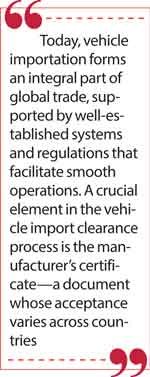Monday Feb 23, 2026
Monday Feb 23, 2026
Monday, 17 November 2025 00:04 - - {{hitsCtrl.values.hits}}

A crucial element in the vehicle import clearance process is the manufacturer’s certificate—a document whose acceptance varies across countries
 By Nadeeka Dissanayake
By Nadeeka Dissanayake
As vehicle technologies continue to advance rapidly, the processes surrounding importation have also had to evolve. Both importers and regulatory authorities have continuously adapted to these changes—refining procedures, updating standards, and ensuring compliance with emerging trends and innovations in the automobile industry.
Today, vehicle importation forms an integral part of global trade, supported by well-established systems and regulations that facilitate smooth operations. A crucial element in the vehicle import clearance process is the manufacturer’s certificate—a document whose acceptance varies across countries.
Manufacturer certificate
Authorities involved with import clearance processes are tasked with altering the regulations imposed on vehicle imports making it more flexible to suit the current trends and technologies. The issuance of manufacturer certification is fundamentally guided by the principles of the World Customs Organisation (WCO), which has established the Guidelines on Manufacturers’ Certificate, also referred to as the Certificate of Origin.
To understand this deeper it is important to delve into the concept of what a Certificate of Origin is. It is a certification that the relevant goods are according to the applicable rules of origin issued as a paper or electronic form by the government authority or a body empowered. It exists in multiple forms and types. The Self-issued Certificate of Origin is a specific form in which the vehicles are certified by the producer, manufacturer, exporter or importer who would expressly certify that the vehicles in concern are originating according to the applicable rules of origin. The WCO states that ‘self-certification systems’ which includes manufacturer certification is acceptable and therefore is increasingly used for clearance of vehicles by Customs officials globally.
Accepted legal evidence
These documents on the face of it serve as evidence of origin and compliance, reducing the need for redundant government-issued verification. Accordingly, these manufacturer certificates, self-issued certificates of origin and supplier declarations are globally recognised and used as standard legitimate documentation used as evidence by the customs authorities worldwide.
According to the WCO, acceptance of these certificates is standard practice unless there is a reasonable suspicion of fraud or misrepresentation. The Revised Kyoto Convention (RKC), the international convention on the simplification and harmonisation of customs procedures, further reinforces this principle. As a party to the RKC, Sri Lanka has not enacted the provisions of the Convention through passing a Parliamentary Act. Yet, as a signatory to RKC, Sri Lanka is expected to accept manufacturer certificates as standard supporting evidence. The RKC’s recommended practices make it clear that documentary evidence should only be demanded when necessary for preferential duties or specific trade measures, and official verification should only be required if fraud is suspected. Excessive scrutiny or rejection of manufacturer-issued certificates would therefore contradict internationally accepted norms.
Country-wise implementation
Acceptance of these documents can be country specific too.
Manufacturer-issued Certificates of Conformity, Certificates of Origin or similar documentation, are accepted routinely by customs authorities in the automotive and technical goods sectors of countries such as the United Kingdom, Singapore, Hong Kong, India, Thailand, Malaysia, the EU, the US, and Japan.
Legally, manufacturer-issued certificates should be treated as valid and sufficient documentary evidence for Customs clearance, valuation, and classification. Any unnecessary rejection or over-scrutiny of such certificates is contrary to the intent of the RKC and international best practices.
Globally, the acceptance of Manufacturer Certificates, Certificates of Origin, and Certificates of Conformity are implemented with country specific criteria.
In the United Kingdom, certificates of conformity are required for registering imported vehicles and confirm compliance with safety and environmental standards. Manufacturer-issued certificates of conformity and certificates of origin are routinely accepted by customs and vehicle registration authorities.
In Singapore, vehicle imports require manufacturer certificates of conformity or test reports recognised by the transport authority. Under these circumstances, Customs accepts supplier or manufacturer declarations as valid proof of origin under the self-certification system.
Traditionally, Sri Lankan vehicle importation procedures have recognised the Manufacturer’s Certificate as a valid and essential document for clearing imported vehicles. It has long served as official verification of a vehicle’s specifications. However, in a recent case involving a leading importer of EVs, authorities refused to accept the Manufacturer’s Certificate to determine the motor power of the vehicles.
Industry experts have expressed that the most practical solution would be to test the vehicles’ motor power at an independent laboratory equipped with appropriate technology.
In response, the matter has escalated to legal proceedings, while Sri Lanka Customs, on its own initiative, appointed an expert committee to examine the technical aspects involved in determining the motor power of electric vehicles.
Nonetheless, the industry continues to question the sudden shift in policy that led to the rejection of the long-accepted Manufacturer’s Certificate—a move that marks a significant departure from established practice.
As the global EV market progresses smoothly with import and export processes that recognise the Manufacturer’s Certificate, Sri Lanka remains in a state of uncertainty. Imported EVs continue to be held at ports, leaving frustrated customers unable to access the vehicles they have already invested in.